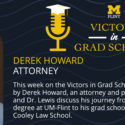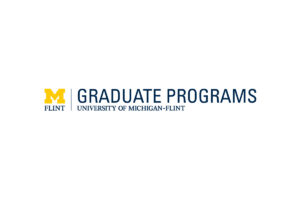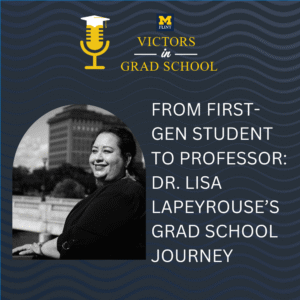Welcome to another episode of Victors in Grad School! In this episode, host Dr. Christopher Lewis sits down with Derek Howard, a successful attorney and past adjunct professor, to discuss his journey through graduate school.
In this episode of the “Victors in Grad School” podcast, host Dr. Christopher Lewis, director of Graduate Programs at the University of Michigan, Flint, engages in a conversation with guest Derek Howard, an attorney and past adjunct professor. The podcast aims to explore the journey of graduate school, offering insights and guidance to students considering higher education.
Derek Howard shares his unique path to graduate school. He initially aspired to become a lawyer right out of high school, choosing the University of Michigan Flint for his undergraduate studies in political science. However, he faced challenges in his early undergraduate years, leading to a five-year hiatus from education. During this time, he managed a retail business but eventually realized that he didn’t want to follow that career path long-term. This realization motivated him to return to school.
Upon returning to the University of Michigan Flint, Derek excelled in his studies, particularly enjoying sociology courses. He contemplated pursuing a PhD in sociology but ultimately decided to attend law school after an internship experience at Genesee County Circuit Court solidified his interest in the legal field.
Derek discusses his decision to attend Western Michigan University Cooley Law School, highlighting practical factors like proximity and scholarships that influenced his choice. He emphasizes the importance of balancing a full-time job with law school, sharing his experiences of juggling multiple responsibilities, including being a manager, law review member, law student, and new father during one challenging semester.
Reflecting on his transition from undergraduate to law school, Derek stresses that law school’s unique educational approach taught him not just the law itself, but also how to educate himself continuously. Law evolves, and lawyers must adapt by constantly researching and staying updated on legal developments.
When asked how his graduate degree prepared him for his current work as an attorney, Derek emphasizes that law school taught him how to do his job effectively. He explains that lawyers must continually educate themselves, understand the reasons behind legal decisions, and use research tools to stay informed and provide the best possible counsel to clients.
Looking back on his educational journey, Derek wishes someone had told him early on that there are different ways to learn and that finding an individualized approach to studying and retaining information is crucial. He advises prospective graduate students to identify the methods that work best for them.
In conclusion, Derek offers specific tips for law students, emphasizing the importance of understanding the “why” behind legal decisions, mastering the tools of analogy and distinction, and grasping legal theory. He also distinguishes between argumentative writing and legal drafting, highlighting the unique skills required for each.
This podcast episode provides valuable insights into the journey from undergraduate studies to graduate school, with a particular focus on the experience of a law school student and attorney. Derek Howard’s personal journey and advice serve as an inspiring and informative resource for aspiring graduate students.
This podcast is brought to you by The Office of Graduate Programs at the University of Michigan-Flint. If you’re still wondering about other things to consider when it comes to graduate school, you can also contact the Office of Graduate Programs at UM-Flint. We’re here to answer questions Monday – Friday from 8:00 a.m. to 5:00 p.m. EST. You can also find out more about the 50+ programs that the university has to offer here.
Transcript
Christopher Lewis:
Welcome to the Victors in Grad School podcast, where we have conversations with students, alumni and experts about what it takes to find success in graduate school. Welcome back to Victors in grad school. I’m your host, Dr. Christopher Lewis, director of Graduate Programs at the University of Michigan, Flint. Really excited to have you back again this week. And every week we have an opportunity to sit down and talk about this journey that you’re on. You might be in graduate school already, or you may just be having that inkling in your head that you’re thinking about continuing your education maybe in a similar path or maybe in a direction where you want to go in a different path from your undergraduate work, or a completely different direction than that either. Or maybe it’s just a completely different direction, and you’re really just exploring. The great thing is that you’re here, you’re listening, and you’re willing to be here to learn because this podcast is all about helping you to find success in that graduate school journey. Every week I have a great opportunity to be able to sit down with other people that have done this before you and they are sharing their own experiences and their own successes. And you never know, maybe some failures along the way as well. This is all being done to help you to not make the same mistakes or maybe to make some of the same mistakes so that you can learn as well as you go through the process. Today we’ve got another great guest with us. Derek Howard is with us today. Dor McWilliams howard PLLC. He’s also a past adjunct professor at Western Michigan University Cooley Law School, as well as a number of other legal opportunities that he took advantage of for many years now. He started his education at the University of Michigan Flint where he studied political science for his bachelor’s degree. And then he went on from there and got his Jurisdictorate degree or his law degree from Western Michigan University Cooley Law School. I’m really excited to have him here today and for having him share his own experiences with you. Derek, thanks so much for being here today.
Derek Howard:
Thank you for having me, Dr. Lewis. I appreciate it.
Christopher Lewis:
My pleasure having you here today and really to be able to learn from your experiences. I guess first and foremost, let’s turn the clock back a little bit. I mentioned the fact that you attended University of Michigan Flint for your undergraduate work and you decided to getting a political science degree. So talk to me about the fact that at some point during that undergraduate experience you had some inkling in your life that you wanted to continue on, you wanted to go on, you wanted to end up in law school. But what were the reasons that made you really decide that you wanted to go to graduate school?
Derek Howard:
Well, when I was coming out of high school, I believed I wanted to be a lawyer. Now, that changes. Students coming out of high school obviously change their minds sometimes, and so that changed over time. But immediately out of high school I wanted to be a lawyer. And when I looked into the programs and was accepted to U of M. Flint, the obvious path was the political science program. So I entered the political science program straight out of high school, and I did that for a couple of years. And then I actually took a break, actually stopped going to school. I don’t know exactly what it was, but for me, I apparently wasn’t into it. And it might have had to do with I just didn’t know how to study or how to be successful in education at that time. I didn’t have anybody helping me with that, I guess. So I took some time off. I actually ended up taking five years off. And after about five years off, I was at this job and I managed a retail business. And I was very young. And I always kind of advanced through whatever business or whatever jobs I had at that time. And so I was a manager and I was one of the youngest managers. It was a multiple presence business, and they brought all the managers down for a meeting to drum up sales and all this. And I looked around the room and there were people, a bunch of people 30 years older than me. And I’m like, I don’t want to be here in 30 years. And so that moment changed. I’m like, I’m going back to school. I don’t care what it takes, I’m going back to school. I went back to school. I re enrolled at University of Michigan Flint. And what’s interesting is the classes that I took that I struggled in in those first two years, I would get A’s in I don’t know if I matured. I knew how to study and what was effective for me in learning material, but I did very well from that point forward. I went straight through and got my undergrad. There was a moment in my undergrad where I thought, well, I don’t know what direction I want to go, especially later in my undergrad. I really enjoyed sociology courses that I took as a part of my undergraduate degree. And so I thought I might go for a PhD in sociology for a time. And I was really struggling in those last couple of semesters and choosing between I knew I was going to do a graduate program. It was either going to be a PhD in sociology or it was going to be a jurist doctorate. And I just really didn’t know. And the deciding factor on that came as an intern. There was an internship I had to do as a part of my undergraduate studies, and I did it at the court in Genesee County Circuit Court, right down the road from U of M Flint. And I was in a courtroom and I was around lawyers and I really enjoyed that so much. That’s easy decision now I really enjoy this. I’m going to go to get a jurisdoctorate degree.
Christopher Lewis:
You did decide to end up going and getting that law degree. You just mentioned that you decided to attend Western Michigan University Cooley Law School. And there’s a lot of options for law schools not only here in the state of Michigan, but beyond the state of Michigan and around the country and beyond. So talk to me about what was going through your head and what ultimately made you decide that Western Michigan University Cooley Law School was the right school for you.
Derek Howard:
So I got out of undergrad and I knew immediately I was going to go into law school. So you take the LSAT, that gets you the testing that lets you certain score to get in and you look at your grades. And I sent around and I actually applied to many law schools. When I was going to U of M Flint, I was living near the Rochester area and that commute was just a difficult commute. It was very practical. I had to work full time while I was going to school. And so not wanting to repeat the commute actually played a role in choosing it. At the time, Western Michigan Coolie Law School had a presence on Oakland University’s campus and that was five minutes down the road and they were willing to give me a nice scholarship. And so even though I was accepted to multiple schools, that just tipped the balance for me. So I started on Oakland University’s campus where their presence was and did that for a while and there was only a certain amount of credits that you could do on that campus before you had to finish your degree in Lansing. So we ultimately did finish in Lansing, but all of the students became close. I think our starting class that semester was 62 students I believe is the right number. And by the time we got kind of said, we’re going to have to go to Lansing to finish up here, we become good friends and commuting together made us even better friends. So we’d share driving responsibilities and go back and forth. And so I really enjoyed that time and the closeness with the groups especially that I commuted with, are still lifelong friends. And so that was the reason for cooley law school. They gave me nice scholarships. They were five minutes off the road when I started and I was a working student. I had to have a full time job while going to school for most of it. There were semesters that I took off that were very important semesters to really devote a bunch more time, but for the most part I was a working student.
Christopher Lewis:
So talk a little bit about that because working while going to graduate school, especially for a law degree is in itself really difficult. And then you have to add on all the other factors and life issues that you’re dealing with in your life. So talk to me about balance and how you were able to balance all of that and still find success during that law school journey.
Derek Howard:
Well, like I said, there were moments or semesters that I found very important in my undergraduate studies. I was also a full time worker. With the exception of my final semester I had waited to do a bunch of classes that required me to be in Flint every day of the week rather than staggering two or three days a week. The same for law school there were semesters where it was just necessary that I kind of pulled back on the work. But I do remember my fourth semester of law school, I think it was. I had a full time job at the court that I ended up working at as a lawyer. I was on Law review which puts out a scholarly journal on a regular periodic basis on legal topics and that itself was like another part time job. On top of it. I was going to law school, which was a part time job and my first son was born so I had what amounted to like four jobs, it felt like which felt very daunting. And when I talk about it I look back at it I go, that was but when you’re in it and you just kind of are in it it just becomes life is how I looked at it. And I just would do. And it’s probably not something that’s healthy to maintain for long stretches but I made it manageable for a few semesters that I had to do that. And you just prioritize the important things. Obviously, getting good grades is very important and being a good father is very important and making money so that I could afford the place I was living in was very important. So I don’t know how I did it when I look back, to be honest. But it just becomes part of life and you just do the best you can. And sometimes that’s what life becomes about is even though you’re short on time in certain things, that you care enough to do as best you can in the amount of time that you have, and you just be efficient with your studies or you be efficient with what’s necessary for the grades that you get or what’s necessary for your job.
Christopher Lewis:
Talk to me also about that transition that you went through. The transition from going from being an undergraduate student to becoming a law school student. Because going to grad school itself is very different than going to law school is also very different in the way that you’re educated and by the way that your professors are teaching you. So as you made that transition from the University of Michigan Flint to law school what did you have to do to set yourself up for success and what did you have to do to maintain that success? Throughout the entire law school journey, there.
Derek Howard:
Was definitely a different educational experience between my undergraduate studies and law school. So undergraduate studies for the most in my liberal arts degree was a reasoned paper or a researched paper and some kind of an exam at the end. I think the most of them, especially later in my bachelor’s degree, ended up looking something like that. In law school. You come into it and you find success by you study a body of law and the body of law appears to be black and white. And it can be in the form of a rule, like a statute or a court rule or some kind of a code or it can be in the form of case law interpreting those things which becomes law in itself. And so what I found fairly early on was success in learning about law became success in learning about the theory behind the reasons that decisions were made in case law. Theory behind why a statute was codified. What was the public policy behind the statute. The reasons behind what you were reading was really the important part of learning to become a good lawyer or finding success in law school. And the material was nonstop. It’s like that I Love Lucy episode with the chocolates coming down the conveyor belt. If you didn’t stay on top of reading these cases and understanding the reasoning behind the decisions, you would dig yourself a hole that was virtually impossible to get out of. Especially if you were juggling that along with a career like I was, or a job that allowed me to go to school even though I had scholarships. It wasn’t enough to not work. I simply had to work. I wasn’t willing at the time to take out loans to cover living expenses. I needed to work. It was necessary. I had a family. And so law school is interesting in the sense that at the end of the day, they can’t teach you everything, so they really teach you how to educate yourself. If a client comes to me today and says, hey, I have this issue and this is what happens. Clients are very good at saying what they experienced, what they think happened, the facts surrounding something, but they don’t know the law, and if you’ve not dealt with it before, it always requires research. I don’t know that I’ve ever had a client come to me. That’s not necessarily fair, but often clients come to me and I don’t know the exact answer to what they’re looking for. But I was trained in law school to find out how to find that answer, to educate myself on that answer and be an expert at it so that I could bring a case and win a case, especially in litigation.
Christopher Lewis:
I think you’re right in what you just said that in regards to the law, going to law school itself teaches you about ways to think about also ways to process things for yourself. Now, as you think back to that education, and now you are thinking about the work that you do on a daily basis, how do you feel that your graduate degree prepared you for the work that you do on a daily basis?
Derek Howard:
It literally taught me how to do my job. There’s no more direct. Well, I don’t know. I guess I don’t have experience at medical degrees. I’m assuming I would be certain would do the same thing. But I don’t know how you’d know how to find these answers because there’s research tools and methods and just like technology changes, how you do it changes. When I went to school, there were electronic or cloud based research tools that you could use, but it was also going to the library and pulling books and understanding how to look at the pocket parts. Any lawyer is going to know what that means. These additions at the end of the book where case law changes, so they’re literally journals of cases that come out of courts that have the ability to make case law and they’re published. So certain courts have the ability to decide whether or not it’s going to be law that everybody has to follow called case law, or it’s going to be an unpublished law that would just be persuasive in certain circumstances if a court wanted to find it persuasive. So when a court overturns a prior case, everything changes. And you have to be able to know where to look to see if that happened. You have to be able to look to see how it’s evolved over time. Because law evolves. It’s living and breathing and new issues come up. You may have seen in the news recently some lawyers relying on Chat GPT to write a brief that created out of thin air cases that didn’t exist. And they filed these in courts and they were actually sanctioned for it by the court. How do we deal with those issues and not just in law or in a courtroom setting? How do our clients deal with those issues and what’s the legality behind those things? So because it’s ever changing, if they just taught us like a foundational knowledge about the law, we would be stuck with what we knew when we graduated if we didn’t have the ability to continue our education. I think it’s kind of what I in part find fascinating about being a lawyer is that it’s continuing education all the time. You have to stay on top of it and you have to something that I wrote about a particular area of the law five years ago isn’t necessarily true today. That may have changed. And so that piece of law school that teaches you practically hands on, how do you go find the answers, how do you make sure that answer is still correct is absolutely necessary in my profession.
Christopher Lewis:
As you think back on your undergraduate experience and also yourself as an undergraduate, as well as the transition that you went through as you went from being an undergraduate into law school, is there anything that you wish that someone would have told you that would have helped you to find success sooner?
Derek Howard:
I don’t know when I finished, because I talked about I had that break those first two years. I wish I would have had some words that when you go into educate and I later taught, and I later looked into educational theory a little bit, and what I learned is that everybody learns a little bit differently, and everybody has different techniques that may be effective for them to learn and retain information and to study. And what works for some people might not necessarily work for others. And that was something that I think I started learning in my later stint into my undergraduate studies. And I learned what worked for me. But it really was reinforced when I started teaching, because I would say the same thing, what I thought was the same thing, and I would have a couple of puzzled looks back in the back of the class, and I would have a couple people nodding their heads, and it’s like, okay, some of you need can I hear this a different way? I remember one class, I was teaching a writing class, and I don’t even remember what the topic was, but I said something, and I had a whole class looking at me with a puzzled look on their face. And so maybe that was me, but I actually drew it kind of I outlined it on the board, and I go this, and they all go, oh. And I go, oh, you’re all visual learners or something like that. And the whole classroom started laughing. It’s just that appreciation that I wish somebody would have told me early on, that how we teach you how to learn. It’s one way, and it might be the way that’s most effective for the largest number of people, which is probably the right way to look at it. But there are other ways, and you need to really find what works for you. You’re the only one that’s going to know that. But I think I kind of figured that out for myself later on. But early on, I wish somebody would have said kind of how we’re showing you my not work for you. There might be a different way for you.
Christopher Lewis:
And as you think about the success you found in law school, are there any tips that you would offer to other students, whether they’re going to law school or just going into graduate school for some other type of discipline that would help them find similar success?
Derek Howard:
Well, there’s a few different types of classes in law school. If you’re talking about substantive law classes, the foundation of the substance, like your contracts, your criminal law, your constitutional law, the property law, these foundational core concepts for those types of classes, it’s important to understand the why. Why did the courts rule? That the way they ruled. Applying statutes understand the value in making good. There’s this tool called analogies and distinctions. If a court decided this particular case this way, and the facts are the most compelling and interesting story of a case, so they’ll start out with this factual, foundation part of an opinion, how did they apply the law to those set of facts? And then when you have your client and you’re trying to make an argument, if you’re doing argumentative writing, you say, well, my client had a similar circumstance, and if the court decided it this way, in a similar set of circumstances, then it also should follow that it would apply it this way now. Or the opposite distinction. No, the court applied this law this way in these set of facts, but we have a different set of facts learning analogy and distinction and theory. I talked about how when a client comes to me, I can’t presume I know the law, but I do know the theory behind almost everything that my kind of law touches on a daily basis or could touch. So when a client comes to me, I can go and think in my head, well, I’d be surprised if it’s not this, even if I don’t know, because I understand the theory behind all of these different fingers of law and kind of combining different issues that pop up on a fairly consistent basis. So for foundational core type of law classes, that’s important. For writing classes, it depends on what kind of writing you want to do, right? There’s argumentative writing, and that’s trying to convince somebody that you’re right. And then there’s legal drafting. I taught them both. Legal drafting is you’re writing something like a contract, where you’re not arguing for one side or another or you’re writing a statute. You want to use certain tools in your writing that make sure that you come across with clarity and you use the right amount of vagueness and you avoid ambiguity and all these tools. So kind of depends on the type of class.
Christopher Lewis:
Eric, I just want to say thank you. Thank you for being here today and for sharing your own experiences. And I wish you all the best.
Derek Howard:
Thank you so much, Dr. Lewis. I appreciate it.





